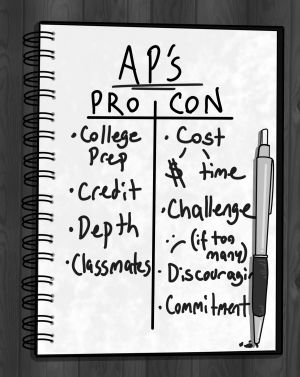Pro: To challenge and stand out, APs should stay
March 2, 2022
When I headed into my junior year, I knew that I wanted to take as many Advanced Placement (AP) classes as I could for a variety of reasons, and so I did. While there are many benefits of taking AP courses, what I really wanted was to be able to set myself apart from others when colleges received my applications, as well as engage with subjects in a fast-moving, comprehensive way. Now with just a semester left in my high school career, looking back I can say that I absolutely made the correct decision; AP classes have proved to be valuable for me in countless ways.
In recent years, more schools have gotten rid of AP classes for different purposes. Institutions like Scarsdale High School, Choate Rosemary Hall and Ethical Culture of Fieldston School have all eliminated APs and replaced them with various other advanced and honors systems. And while Masters has begun to question the practicality of APs, the truth is that a removal of AP courses entirely would serve not as a benefit, but instead, a detriment to the student body.
In a 2018 opinion piece written in The Washington Post by eight heads of private D.C. area schools, arguments against AP classes ranged from colleges placing less importance on them, to the fact that APs cause students to spend more time memorizing and less time learning deeply. And while there is some truth to these arguments, personal experience as a high school student has shown me otherwise.
The article argues that AP classes are becoming less important as more students enroll in them, but this claim fails to take into account the full scope of things. According to a U.S. News blog about college admissions, “generally” the most important part of a college application “is the GPA and challenging high school curriculum,” said Jeannie Borin, the founder & president of College Connections, a college consulting service that has aided over 4,000 families in the college search process since its establishment in 2003. As someone who has visited around a dozen colleges thus far, this fact has been confirmed at every single information session: GPA and rigor of course load are the most important components of an application for colleges. Even if more students across the nation are taking AP courses, being unable to take AP courses sets students who are looking at the most competitive schools behind the eight-ball straight away, for they will be deemed sub-par in relation to their peers.
According to Crimson Education, a service that helps students get accepted to their desired colleges, “For students aiming for the Ivy League and Top 20 schools in the United States, a good target is to take (and pass) 10-14 AP classes throughout your high school career — or 3-4 each year.” While they also note that it is important to have a balance in life and taking into account that Masters only allows students to take a maximum of three AP classes in their junior and senior years, it is necessary for students to utilize these higher level courses to better their transcript. Although colleges continuously say that they look at students within the context of their school – that is they won’t judge a student for not taking AP classes if AP classes are not offered at their school – a student who wants to but is not able to take AP courses is unable to set themselves apart from a student that would not have chosen to take AP courses even if they had been offered.
At the same time, it is important to recognize that not every student will be looking to attend the most competitive schools, but instead will be taking AP courses for another reason: the credit. While AP credit rules differ between schools, credits acquired through high scores on AP exams allow students to have more opportunities in college. This means that students may have the ability to take higher level courses going in, skip classes entirely (which can help those that want to graduate earlier to save tuition), or both. As someone who wants to explore a variety of subjects in college, earning AP credit to skip certain courses would grant me the freedom, and time, to take classes in numerous fields, which is exciting.
Even though taking AP courses now will serve me well down the line, I recognize that AP courses have current benefits, too. I have always loved fast-paced classes and AP courses provide me with the opportunity to learn in that environment. Furthermore, taking AP courses, which are often challenging for the speed and immense amount of material covered, I have begun to recognize the importance of creating good homework and study habits. While no high schooler is perfect with time management, learning these skills now will only continue to serve as a benefit as I transition to college life.
Additionally, while AP courses are great for students that learn at a fast pace and for those that like to absorb a lot of information, taking AP courses has allowed me to dive deep into subjects that are interesting to me. For example, because I want to study finance in college, I wanted to, and did, sign up for AP Statistics this year. Through this class, I have been able to learn thoroughly about a subject that greatly intrigues me, enhancing my learning experience.
While I believe that we should keep AP courses, I am clearly not the only one who holds this opinion. In a survey sent out to the Class of 2024 and the Class of 2025, 92.9% of respondents (99 responded out of 253 students) stated that they wish to take AP courses during their junior and/or senior year. Additionally, in a survey sent to the Class of 2022 and the Class of 2023, out of those who have chosen to take AP courses, 84.8% of respondents are happy with their decision (79 students, who take AP classes, responded to this question (88 people responded to this survey in total) out of 258 students).
Yet though AP courses provide numerous benefits to students, it’s no secret that they are limiting in certain areas. Common complaints include a course curriculum that is too fixed, a homework load that is too great, etc… And while there is some truth to these arguments, the fact of the matter is this: if students do not want to take AP classes for any reason, then they simply should take the standard course, or an elective course, in that subject. Eliminating AP classes does not solve any sort of problem for the students that are opposed to taking them, but instead it only hurts students that do want to take these advanced classes.





